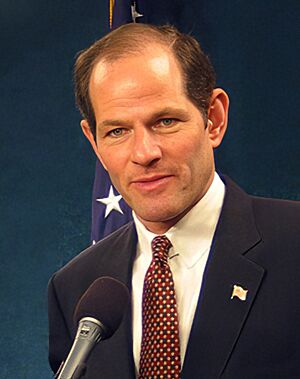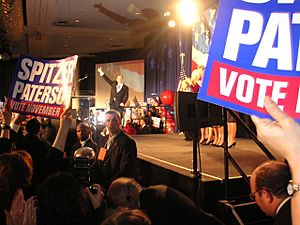Eliot Spitzer facts for kids
Quick facts for kids
Eliot Spitzer
|
|
|---|---|

Spitzer in 2004
|
|
| 54th Governor of New York | |
| In office January 1, 2007 – March 17, 2008 |
|
| Lieutenant | David Paterson |
| Preceded by | George Pataki |
| Succeeded by | David Paterson |
| 63rd Attorney General of New York | |
| In office January 1, 1999 – December 31, 2006 |
|
| Governor | George Pataki |
| Preceded by | Dennis Vacco |
| Succeeded by | Andrew Cuomo |
| Personal details | |
| Born |
Eliot Laurence Spitzer
June 10, 1959 New York City, U.S. |
| Political party | Democratic |
| Spouse |
Roxana Girand-Spitzer
(m. 2020) |
| Children | 3 |
| Parent |
|
| Education | |
| Signature |  |
Eliot Laurence Spitzer (born June 10, 1959) is an American politician and lawyer. He was the 54th governor of New York from 2007 to 2008. Before that, he served as the attorney general of New York from 1999 to 2006. As a member of the Democratic Party, he was known for taking on powerful companies.
Spitzer was born in the Bronx, a part of New York City. He went to top schools like Princeton University and Harvard Law School. He started his career as a lawyer and then became a prosecutor, fighting crime in Manhattan. As attorney general, he became famous for fighting corruption on Wall Street, earning him the nickname "Sheriff of Wall Street."
In 2006, he was elected governor of New York by a huge margin. However, his time as governor was short. He resigned in 2008 after a major personal scandal became public. His lieutenant governor, David Paterson, took over for the rest of his term.
Since leaving office, Spitzer has worked as a TV host, a college teacher, and a real estate developer. He also ran for New York City Comptroller in 2013 but did not win his party's nomination.
Contents
Early Life and Schooling
Eliot Spitzer was born in the Bronx, New York City. His mother, Anne, was an English literature professor, and his father, Bernard Spitzer, was a successful real estate developer. His family was not very religious.
Spitzer was a very good student. He graduated from the Horace Mann School in 1977. He scored a nearly perfect 1590 out of 1600 on the SAT, a college entrance exam. He then went to Princeton University, where he was elected chairman of the student government.
After Princeton, he went to Harvard Law School to earn his law degree, which is called a Juris Doctor (JD). While at Harvard, he was an editor of the Harvard Law Review, a very respected legal journal.
Career as a Lawyer
After law school, Spitzer worked for a judge and then for a law firm. Soon after, he joined the Manhattan District Attorney's office. A district attorney is a lawyer who prosecutes, or tries to prove, that someone has committed a crime.
Spitzer worked there for six years, from 1986 to 1992. He became the chief of a unit that fought against organized crime. His most famous case was against the Gambino crime family. He helped stop their control over the trucking and clothing businesses in Manhattan.
In 1992, Spitzer left the District Attorney's office and went to work for private law firms. He handled cases related to consumer rights and business competition.
New York State Attorney General
The Attorney General is the top lawyer for a state. They represent the state in legal cases and protect the rights of its citizens.
Running for Office
Spitzer first ran for Attorney General in 1994 but lost. He ran again in 1998. This time, his campaign was partly funded by large loans from his father, which caused some controversy. Despite this, he won the election by a very small margin. In 2002, he was re-elected easily, winning a second term.
Work as Attorney General
As Attorney General, Spitzer became known for taking on big national issues, not just local ones. He focused on crimes committed by large corporations, such as fraud in the stock market and on the internet. He also worked to protect the environment.
His tough approach to powerful financial companies earned him the nickname "Sheriff of Wall Street." Many people praised him for fighting for ordinary people against corporate wrongdoing. In 2004, a magazine called The Nation suggested he would be a good candidate for Vice President of the United States.
Becoming Governor of New York
In 2004, Spitzer announced he would run for governor of New York. He chose State Senator David Paterson to be his running mate for lieutenant governor. Many important Democrats supported him.
In the Democratic primary election, he easily beat his opponent, Thomas Suozzi. On November 7, 2006, Spitzer won the general election against Republican John Faso. He won with 69 percent of the vote, the largest victory margin in a New York governor's race ever.
Time as Governor
Spitzer was sworn in as governor on January 1, 2007. He promised to bring change and strong ethics to the state government in Albany.
Challenges and Controversies
Spitzer's plans for reform faced challenges. He had disagreements with the state legislature, which is the part of government that makes laws. Some lawmakers felt he was not willing to compromise. In one famous moment, he reportedly told a legislative leader, "I'm a... steamroller and I'll roll over you." This "steamroller" reputation made it hard for him to work with others.
One major controversy was called "Troopergate." An investigation found that Spitzer's office had used the State Police to gather and release negative information about his main political opponent, State Senate leader Joseph Bruno. Spitzer accepted responsibility for his office's actions.
Another controversy involved his plan to allow undocumented immigrants to get New York driver's licenses. The plan was very unpopular with the public and was blocked by the State Senate. Spitzer eventually had to withdraw the plan. These issues caused his approval ratings as governor to drop.
Resignation from Office
On March 10, 2008, news reports revealed that Spitzer was involved in a major personal scandal. The news became a huge story across the country and the world.
Facing intense pressure and the possibility of being removed from office, Spitzer announced his resignation on March 12, 2008. In a public statement, he said, "I cannot allow for my private failings to disrupt the people's work... I can and will ask no less of myself. For this reason, I am resigning from the office of governor."
His resignation took effect on March 17, 2008. Lieutenant Governor David Paterson then became the new governor of New York.
Life After Politics
After resigning, Spitzer stayed involved in public life in different ways.
Media and Teaching
Spitzer began writing columns for Slate magazine, mostly about the economy. He also became a TV host. He co-hosted a show on CNN called Parker Spitzer, which was later renamed In the Arena. After that, he hosted a show called Viewpoint with Eliot Spitzer on Current TV.
In 2009, he also started teaching a political science class at the City College of New York.
Business and Another Campaign
In 2012, Spitzer became an investor and board member for a financial technology company.
In 2013, he decided to run for political office again. He entered the race for New York City Comptroller, an important city official who manages finances. He said he was asking voters for forgiveness. However, he lost the Democratic primary election to Scott Stringer.
After his father's death in 2014, Spitzer took over his family's real estate business, Spitzer Enterprises.
Personal Life
Eliot Spitzer married Silda Wall in 1987. They have three daughters. Silda stood with him when he announced his resignation as governor. They announced the end of their marriage in late 2013.
In 2020, Spitzer married Roxana Girand, the founder of a real estate agency.
Images for kids
-
Spitzer with Hillary Clinton in 2007
See also
 In Spanish: Eliot Spitzer para niños
In Spanish: Eliot Spitzer para niños
- Inside Job – documentary on the 2008 financial crisis
- The Good Wife – a TV show partly inspired by events involving Spitzer and his wife
- List of Jewish American jurists
 | William Lucy |
 | Charles Hayes |
 | Cleveland Robinson |



